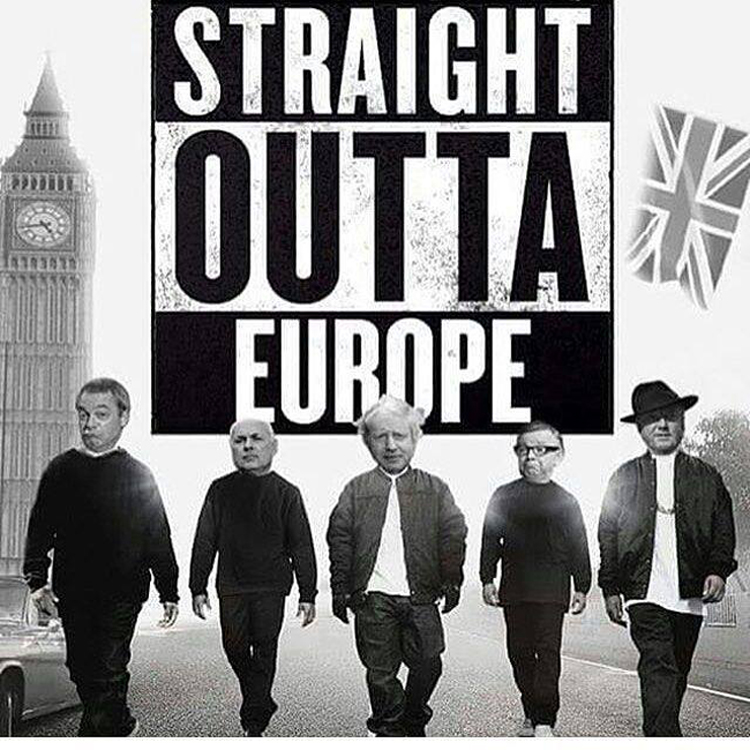
The controversial news of Britain’s exit from the European Union has sent shock waves around the globe and the responses and perceived consequences are not only limited to political or economical concerns. Many members of the world’s music community have taken to social media to express their concerns over Britain’s departure from the EU. Concerns that extend beyond the socio-political climate, but also how this will effect things such as costs of manufacturing albums, as a large majority of pressing plants are located in Europe, and the practicality of touring, as British artists may have to apply for individual visas for each country that they wish to travel to. In fact the term Brexit (reminiscent of Orwellian Newspeak) has already morphed into Regrexit signifying the obvious disillusion over the ostensibly misguided decision.

During her performance at Down The Rabbit Hole Festival in the Netherlands, iconic English poet and musician P J Harvey delivered a short speech mid-way through her concert in response to Brexit and also recited John Donne’s 1624 poem “No Man Is An Island”.
Anohni (formerly Antony & The Johnsons) also passionately tweeted last night that Brexit “is a prison Riot”.
https://twitter.com/rebismusic/status/747074255779598336
Electronic duo Disclosure simply tweeted a series of sad-face emojis either side of the British and EU flags.
???????????
— Disclosure (@disclosure) June 24, 2016
Enigmatic Radiohead front man Thom Yorke and producer Nigel Godrich both shared on twitter the official parliamentary petition requesting a second referendum.
— Thom Yorke (@thomyorke) June 25, 2016
Petition: EU Referendum Rules triggering a 2nd EU Referendum https://t.co/mjo0k61vYQ
— nigel godrich (@nigelgod) June 25, 2016
The petition can be seen here:
Glastonbury Festival officials posted leaflets around the sites camping grounds stating that they will miss their “little mate the EU.”
— Glastonbury Festival (@GlastoFest) June 24, 2016
NPR, one of America’s largest non-profit media organizations, released a mixtape of “British songs that reflect people’s sentiments in the U.K.”
Although it may be too early to fully grasp the extent of how this may affect Britain’s, and indeed the worlds, music community it is clear that many are dismayed by the seemingly misinformed decision. Immediately after the referendum was passed “What is the EU?” was recorded as the highest googled subject in the UK. However, what might be some of the practical implications of England’s divorce from the EU?
According to an article published by Consequence Of Sound, a few things that may occur in the wake of this decision is higher costs for touring as the British Pound plummeted over night to it’s lowest value against the US dollar in 31 years, as well as $2 Trillion being wiped off the world markets. Tighter border control means added travel restrictions, which could also boost the cost of flying and therefore making it harder for smaller bands and artists to travel abroad.
In an article recently published by Pitchfork, which asked some of Britain’s Music Industry experts, an industry that outperformed other British industries by 5% in 2015, their thoughts on Brexit, one aspect that might prove to become increasingly complex is the cost and ease of acquiring visas to perform in other countries, a process that is already expensive and time consuming. Obtaining travel visas may become too difficult for many artists and will ultimately impede “free movement across much of Europe’s mainland.” And this is just the top of the proverbial iceberg. Other areas that may be affected are record label and copyright issues and EU funding for the Arts.
In a bizarre and highly unsuccessful attempt to garner support from younger people, an event called Bpoplive was organized by Leave.eu. Self described on their Facebook page, which contains only 1 follower, as “the most exciting music-event/political-rally of all time.” Bpoplive attempted to sequester some of Britain’s leading acts such as Sigma and Alesha Dixon, though failed to inform them that Bpoplive was a political rally in support of leaving the European Union resulting in most of the headlining acts dropping out.
It is baffling that with all of its seemingly disorganized and dubious dealings that the Brexit campaign was successful at all. Perhaps its success lies in the potentially hollow promise of redirecting the millions of dollars given to the EU each week back into the DHS. Or perhaps its success was based on current rising tide of fears and prejudices towards the recent wave of mass immigration into Europe of those seeking refuge. Whichever way the wind blows the effects are sure to be felt across the music and arts industries, all the world over for years to come.
What’s your take on the Brexit situation?







